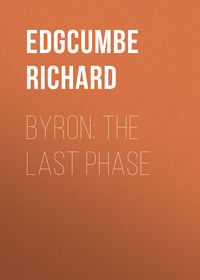Sadece Litres'te okuyun
Kitap dosya olarak indirilemez ancak uygulamamız üzerinden veya online olarak web sitemizden okunabilir.
Kitabı oku: «Byron: The Last Phase», sayfa 21
Bir şeyler ters gitti, lütfen daha sonra tekrar deneyin
5,0
1 puan
Türler ve etiketler
Yaş sınırı:
12+Litres'teki yayın tarihi:
11 ağustos 2017Hacim:
461 s. 2 illüstrasyonTelif hakkı:
Public Domain